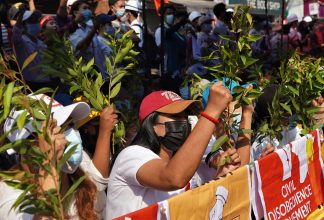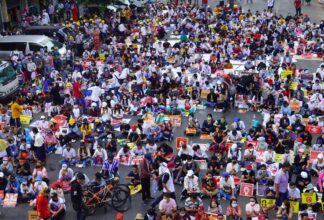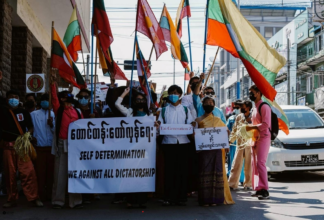Serious Setback for Freedom of the Press in Myanmar
Four journalists and the boss of the now defunct Unity magazine in Myanmar have been sentenced to ten years imprisonment with hard labour. Journalists who protested against the sentences over the weekend also risk prosecution, under the Peaceful Assembly and Peaceful Procession Law.
Journalists Lu Maw Naing, Yarzar Oo, Paing Thet Kyaw and Sithu Soe and CEO Tint San at Unity published an article about an alleged chemical weapons factory in Pakokku, in central Myanmar in January. Last week, they were found guilty both under the Official Secrets Act and of trespassing. The sentence – ten years imprisonment with hard labour for all five defendants has met with an outcry both internationally and from journalists and human rights groups inside Myanmar.
“This judgment shows prejudice against journalists in Myanmar”, said human rights lawyer Than Zaw Aung, who defended one of the five Unity staff members.
Following the court decision, journalists gathered in protest outside the Myanmar Peace Center in Rangoon, where President Thein Sein visited an event. When they were denied entry to the event, a silent protest ensued. 50 journalists now risk charges under Article 18 of the Assembly Law.
“The situation is going from bad to worse. There is an urgent need for renewed pressure on the Myanmar government to ensure human rights defenders, including independent investigative journalists, are able to operate without fear of reprisals”, said Brittis Edman, Southeast Asia Programme Director at Civil Rights Defenders.
In response to the crackdown, several lawyers have mobilised into action to form the Myanmar Media Lawyer Network to support journalists who risk prosecution because of their work.
Than Zaw Aung, one of the founders of the network and says that the Unity case and the threat of prosecution of those protesting against it point towards a repressive trend, with those reporting on sensitive issues being the main targets.
“The trial against my clients was unjust and political, not independent, he said, explaining how the government’s office filed the initial complaint against Unity, and appears to have sent a request for a named prosecutor for the case. This blends the administration with the judiciary” said Than Zaw Aung.


